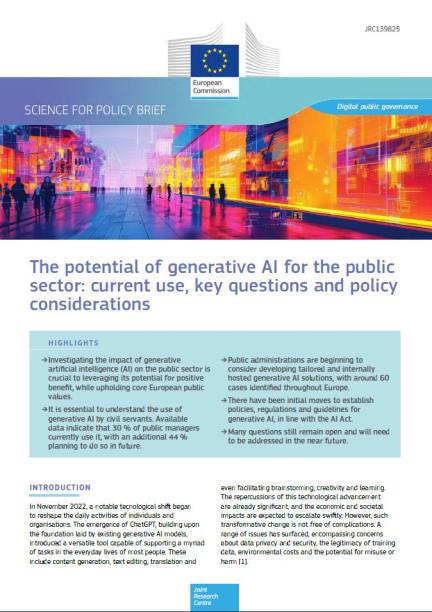

Year: 2024
Authors: TANGI Luca; COMBETTO Marco; HUPONT TORRES Isabelle; FARRELL Eimear; SCHADE Sven.
The advent of generative AI presentes unprecedents opportunities and challenges within the public sector, calling for a detailed examination of its influence to harness its capabilities while safeguarding fundamental European values. This policy brief aims to examine the current usage, possible benefits, challenges and future prospects for the use of generative AI in the public sector. It analyses the phenomenon from three perspective.
At individual level, our analysis of the current landscape reveals that 30% of public managers are using online generative AI technologies, with anticipation of increased adoption, as evidenced by an additional 44% planning to integrate these tools in the near future.
At organisational level, public administrations are actively exploring the creation of in-house generative AI applications, with approximately 60 use cases currently identified across Europe. Moreover, still at organisational level, some public administrations are developing guidelines to suppoort civil servants in using generative AI.
Finally, at national level, there is a burgeoning effort to craft necessary policy frameworks and regulatory mechanisms to guide the ethical and effective use of generative AI. Some member states are also considering the development of national generative AI models to better support official national lan-guages, particularly those less represented.
Despite these advancements, the discourse surrounding generative AI in the public sector is punctuated by numerous unresolved questions, particularly regarding long-term implications, governance, and the balance between innovation and privacy. As the landscape continuously evolves, an urgent need for continuous evaluation and policy adaptation emerges. Addressing these open inquiries will be critical in ensuring that the integration of generative AI into public services not only boosts efficiency and effectiveness but also adheres to the high standards of ethics and transparency expected within European public institutions.
Categorisation
Attachment
Shared on


